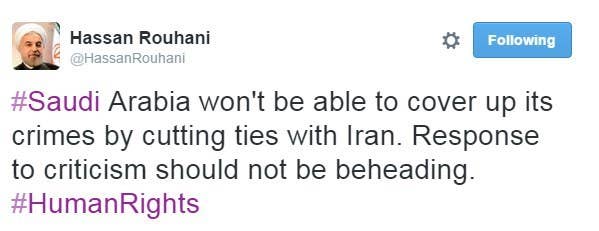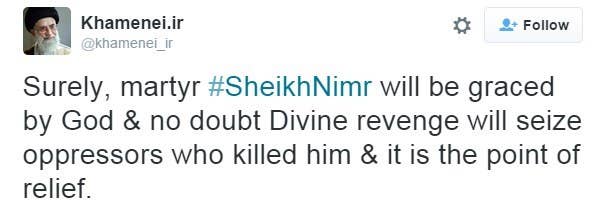When Saudi Arabia announced that 47 individuals convicted of terrorism charges were executed on January 2, one death sparked the severing of diplomatic ties between Iran and multiple Middle Eastern countries. Nimr al-Nimr, a Shia Sheik and outspoken critic of the Saudi government, was one of 47 executed, sparking protests and tumultuous debates throughout the Middle East and Western powers. So, what is it about al-Nimr that escalated diplomatic fractures in Middle Eastern countries?
Sheik Nimr, a Saudi-born Shia Islamist, has criticized the Saudi government for years, including the need for free elections and better representation for the Shiite minority community. In October 2014, Nimr was sentenced to death for foreign meddling in Saudi Arabia, disobeying Saudi rulers and taking up arms against security forces.
Following the execution, attacks on the Saudi Embassy and Consulate in Iran further fueled the fire, causing Saudi Arabia to announce its plans to sever ties with Iran, providing Iranian diplomats 48 hours notice to leave the country. Both President Rouhani and Supreme Leader Khamenei took to social media to denounce the execution and severing of ties between both states.


So, what happens next? The tensions rising in both states is based on more than just Sheik Nimr's death. Iran and Saudi Arabia's relations have been feeble for decades, especially with a Saudi-led coalition helping Yemen while simultaneously accusing Iran of backing the Houthi rebels. Saudi Arabia has formally ended a ceasefire with the Houthi rebels on January 4, putting the lives of Yemen civilians in serious danger. Furthermore, this disagreement goes beyond Saudi Arabia and Iran. As days pass since the execution and protests, countries across the Middle East and Africa have begun to choose sides. Bahrain, Sudan, UAE, and Kuwait are backing Saudi Arabia, by either cutting ties or reducing their affiliation with Iran. However, one radical organization and one prominent individual is backing Iran- the Lebanese Hezbollah Movement and President Assad of Syria- both of whom have received support from Iran in the past. Many states have stayed quiet on the issue, including Israel and the Palestinian Authority (PA), but will this be the case for much longer? It's hard to tell, especially with Israel and PA lacking any real collateral in the fight.
Just as importantly, we must ask if the United States will involve itself in an effort to deescalate current events? The Obama Administration voiced its concerns that the growing tensions will weaken the fight against ISIS. Could this dispute somehow hurt the fight against ISIS, or worse, allow ISIS to grow? The number one concern of the Obama Administration is the war in Syria and bringing some sort of stability to the Middle East, but can that now happen? If tensions grow in Iran and Saudi Arabia, and fighting ISIS is put on the back burner, I fear for the future state of the Middle East and the possible reality of its radical organizations. The House of Saud has been vocal in its opinions on terrorism and radical groups like ISIS, especially with the announcement from Deputy Crown Prince and Minister of Defense Muhammad bin Salman on the coalition to fight radical groups in the Middle East. However, is it plausible that this coalition will be a second thought with the anger building between Iran and Saudi Arabia. Or worse, the coalition could be used for more bad than good. Note that ISIS thrives on instability, i.e. Libya and Yemen, providing a sort-of regime for displaced and angry individuals. Furthermore, Saudi Arabia, Iraq and Syria already account for the largest presence of ISIS-affiliated twitter accounts. Unfortunately, it is too soon to tell what will happen within this conflict. Perhaps tensions will cool. Perhaps tensions will linger. One thing is for certain: Add ISIS into the Saudi-Iran conflict and you have a recipe for disaster.

